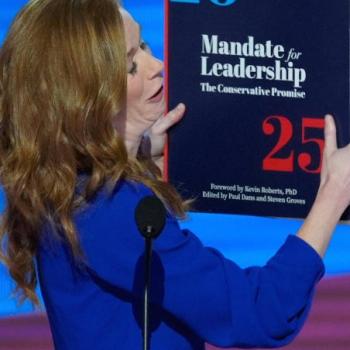Again, I awake to news of an inexplicable mass shooting, people gunned down in the most mundane of places, this time a movie theater. Again, I read the same worn arguments from anti-gun control folk, who insist that a legally armed citizen might have stopped alleged gunman James Holmes before he killed a dozen people. Again, I wonder if this time the ready availability of firearms in our country will become a topic of thoughtful discussion rather than a mere blip in the news cycle. And again, I wonder why Christians aren’t bringing the same dedication to talking about guns as we do to other issues, notably abortion and homosexuality.
When it comes to gun violence, Christians too often either say nothing, or parrot a conservative political position embodied by the NRA and others who, all evidence to the contrary, insist that guns in the hands of law-abiding citizens are more likely to prevent senseless violence than enable it. (Some far-right Christian folk insist on the right to arm themselves against a government intent on destroying religion and oppressing its citizens.) The gun-wielding-citizen-as-protector ideal is nonsense. Police officers go through hours of specialized training to help them discern when the use of deadly force is justified. As we know from not a few front-page tragedies involving police shootings, despite such rigorous training, even the best-trained officers don’t always get it right. Yet we want to believe that an armed citizen with a few hours of practice on the shooting range will be able to make split-second judgments well enough to ensure that the only people who end up dead are the bad guys. We don’t have to look any farther than an early February morning in a Florida gated community to know that such a belief is sadly misplaced.
Perhaps some well-meaning gun-toting citizen could have stopped James Holmes before he murdered a dozen people. Or perhaps that gun-toting citizen would have been perceived as a threat and gunned down by the police (or another gun-toting citizen). Perhaps that citizen, shooting in a dark theater of panicked people instead of on a quiet shooting range, would have missed the target and upped the death tool to 13 or more. Perhaps he or she would have accidentally killed a teenager with nothing more threatening on him than a box of Skittles.
Christians ultimately look for guidance not only to common sense, but to Jesus and God as portrayed in Scripture. On issues of sexuality and babies, Jesus and the Bible can be a bit murky. Yet Christians consistently speak on these issues with certainty and passion. In contrast, Jesus was crystal clear on the question of whether violence is an acceptable response to violence, on whether arming ourselves with fists or swords or guns is the way to protect ourselves from fists and swords and guns. Nonviolence—turning the other cheek, keeping your sword in its scabbard even under threat, loving your enemy—is a centerpiece of Jesus’s gospel. And yet Christians (at least, the conservative Christians who frequently represent our faith, however incompletely, on the national media stage) have largely been silent on guns for more than a decade, as the front-page stories have piled up—lone gunmen able to give deadly voice to their rage, alienation, and mental illness by mowing down fistfuls of human beings in seconds, because they could easily obtain weapons that make such fast and furious violence possible.
For about 18 months, I was a regular contributor to a women’s blog hosted by Christianity Today, the premier magazine for evangelical Christians. In January 2011, I told the blog editor that I would like to write something about guns in response to Jared Loughner’s shooting of Representative Gabrielle Giffords and others in a Tucson supermarket. The editor was hesitant, but said she would read and consider what I wrote. I sent an essay to my editor, and received an enthusiastic e-mail back, in which she praised me for writing a piece that not only put a clear feminine spin on the tragedy, but also raised the issue of gun control gently. On a Thursday afternoon, she wrote, “I’ll post this first thing in the morning.” That Friday morning, I opened up the blog and found, instead of my piece on the Tucson tragedy, a review of a year-old book about dating. When I e-mailed the editor to ask what happened, she said she had decided to show my post to some higher level editors, who killed it. She quoted them as saying that they felt they “cannot win” on the gun-control issue with their evangelical readership. Huh. I didn’t realize that winning was the goal of our Christian witness to a violence-saturated, self-absorbed, consumer-driven culture. My guess is that the editors really meant, “We might lose subscribers if we post an article suggesting that it might be time to reconsider a ban on assault weapons and large-capacity magazines designed to mow down as many human beings as possible in the shortest possible time.” (My tenure as a Christianity Today blogger, by the way, ended eight months later, when editors, tipped off by some particularly venomous commenters, read things I had written on my own blogs and decided that my views were not sufficiently pro-life for their evangelical readership—the term “pro-life” applied solely, of course, to a particular view on abortion rather than a broad concern with how we treat and interact with other human beings, including those on either end of a pointed gun.)
Gun control is not about winning or politics or fantasies of well-played vigilante justice. It’s about taking weapons of mass murder out of the hands of those who would use them for ill (such as James Holmes) as well as those who would use them for good but possess the universal human capacity to screw up (such as George Zimmerman). Gun control is about following the One who didn’t leave us a clear road map for issues around babies and sex (which doesn’t stop us from preaching our own positions on these topics as God’s will), but left no question about how his people are to respond to violence. We are to put aside our weapons, even when our instinct is to use those weapons to protect the people who are most precious to us. From Matthew 26:
While Jesus was still speaking, Judas, one of the Twelve, arrived. With him was a large crowd armed with swords and clubs, sent from the chief priests and the elders of the people. Now the betrayer had arranged a signal with them: “The one I kiss is the man; arrest him.” Going at once to Jesus, Judas said, “Greetings, Rabbi!” and kissed him. Jesus replied, “Do what you came for, friend.” Then the men stepped forward, seized Jesus and arrested him. With that, one of Jesus’ companions reached for his sword, drew it out and struck the servant of the high priest, cutting off his ear. “Put your sword back in its place,” Jesus said to him, “for all who draw the sword will die by the sword.”
And those who live by the gun—who look to guns to protect us from guns—will die by the gun. Again and again and again. Until we decide we’ve had enough.















